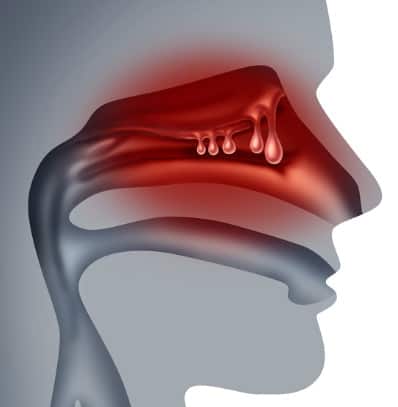Diagnosis, Treatment, and Prevention of Recurrence
Nasal Polyps are soft, fleshy growths that occur in the nasal passages and sinuses of a small percentage of the population (1-4%). They resemble peeled grapes. When present, polyps can cause nasal obstruction, decreased sense of smell and blocked drainage. Inadequate ventilation of the sinuses results in stagnant mucous staying in those sinuses.

Occasionally, a single large polyp will grow and extend into the nose. Although benign polyps are more common than nasal and sinus cancers, any growth in the nose should be evaluated by an ear, nose and throat physician to rule out the possibility of cancer.
Most nasal and sinus polyps occur in response to inflammation in the nose and sinuses. Polyps are associated with many different medical conditions including Allergic Rhinitis, Chronic Sinusitis with Nasal Polyps, Cystic Fibrosis, Allergic Fungal Sinusitis, Samter’s Triad (Aspirin Exacerbated Respiratory Disease), Eosinophilic Mucin Rhinosinusitis and Asthma (some cases, not all cases of asthma, are associated with nasal polyps).
Treatment of nasal polyps has traditionally included medications designed to decrease the inflammation of the nasal and sinus mucous membranes in hopes of shrinking the polyps.
When medical therapy fails to treat the polyps effectively, surgery is often recommended to clear the nasal passages and sinuses. For most patients, surgery results in improved nasal breathing and may also enhance your sense of smell. It often decreases the frequency of acute sinusitis as well.
One challenge with nasal polyp treatment is the prevention of recurrence of the polyps. While surgery helps remove the polyps, restore nasal breathing and may improve the sense of smell, it does not change the patient’s unique immune system or the patient’s living environment. The patient who returns to the same environment (which includes air quality, diet, and lifestyle) may have a recurrence of the causative nasal inflammation with regrowth of the polyps as a result. This is why additional treatments are a standard part of nasal polyp care.
We closely follow our patient symptoms long term. We focus on the prevention of recurrence of the polyps. Unfortunately, patients and physicians have had poor success in reliably preventing nasal polyp recurrence in the long term.
Triggers or causes can include genetic predisposition, allergens, air pollution, dust, chemical exposures, certain foods, bacterial toxins and altered microbiome (the population of microorganisms found on our mucous membrane surfaces).
Call Benjamin Liess MD at (207) 415-4841 for more information or to schedule an appointment.